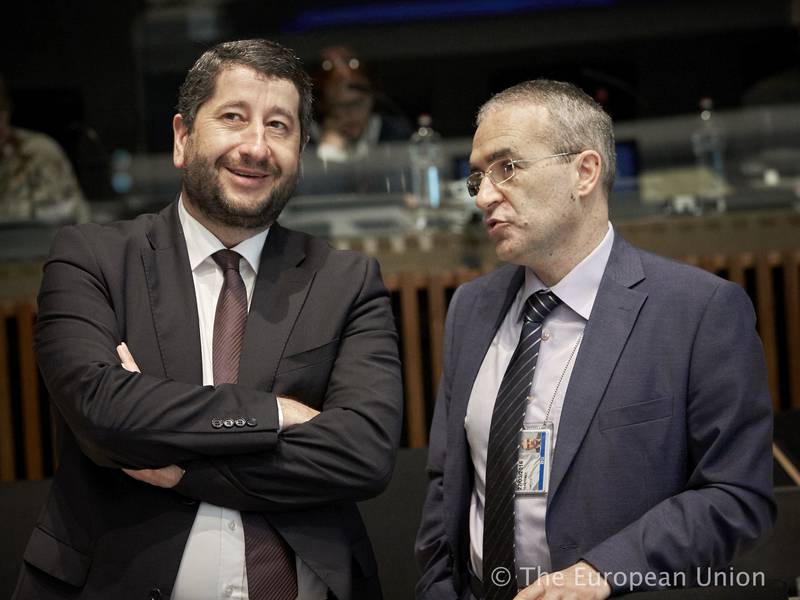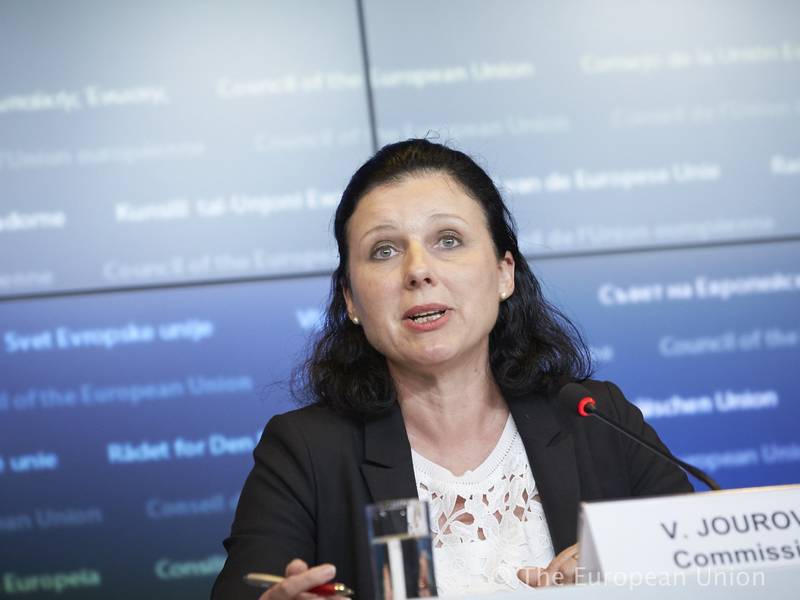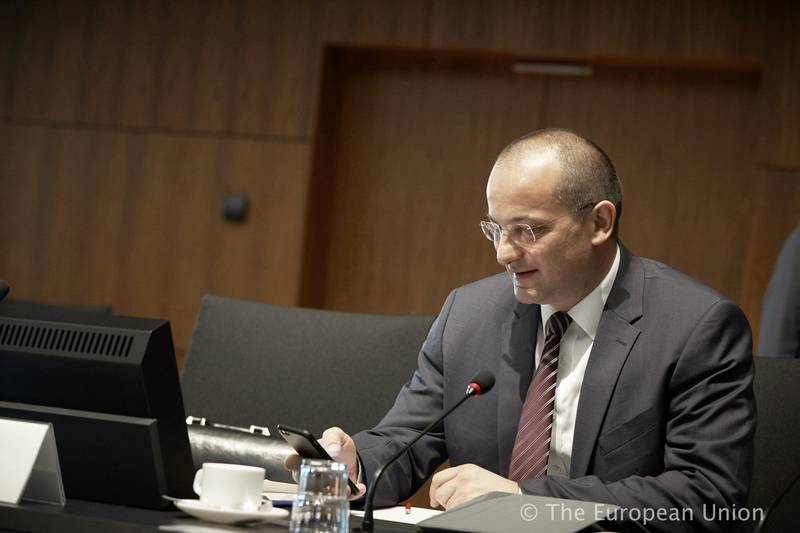Work on a Major Part of the European Prosecutor's Office Is Frozen
Adelina Marini, August 22, 2015
 It was exactly two years ago that the European Commission proposed the establishment of a single European Public Prosecutor’s Office (EPPO) to fight EU funds embezzlement. In the two years that passed progress made is negligible and proved correct the expectations that this will be one of the most difficult European dossiers, for a sizable step towards bringing up so far purely national competences to the European level is made with it. Between the refugees and migrants’ crisis as well as the freshly inflamed Greek crisis, the discussion on the future of the European prosecution was left aside, but it was one of the major topics on the agenda of the Justice and Home Affairs Council in June with another public debate held at that time too. It is curious that legislation work is done a piece at a time. This could explain why the ministers decided to freeze work on articles 1 to 16 of the draft regulation for now and continue working on the others – 17 to 33.
It was exactly two years ago that the European Commission proposed the establishment of a single European Public Prosecutor’s Office (EPPO) to fight EU funds embezzlement. In the two years that passed progress made is negligible and proved correct the expectations that this will be one of the most difficult European dossiers, for a sizable step towards bringing up so far purely national competences to the European level is made with it. Between the refugees and migrants’ crisis as well as the freshly inflamed Greek crisis, the discussion on the future of the European prosecution was left aside, but it was one of the major topics on the agenda of the Justice and Home Affairs Council in June with another public debate held at that time too. It is curious that legislation work is done a piece at a time. This could explain why the ministers decided to freeze work on articles 1 to 16 of the draft regulation for now and continue working on the others – 17 to 33.
The first 16 articles cover the organisation and structure of the future European prosecution and the rest deal with its tasks, accountability and investigations. The deadline for the establishment of the EPPO according to the initial EC proposal is January 2016. The European Commissioner of Justice Věra Jourová (Czech Republic, ALDE) insists that this deadline can be met. She said, during the discussion in the Council of ministers on June 15, “The goal to set up the EPPO by 2016 remains valid”. According to the Luxembourg minister, whose country took up the Presidency of the Council on July 1st, however, the remaining five months to the end of the year will not be sufficient to reach a final agreement.
There are huge disagreements between member states on the structure of the prosecution and its role. To some, the more centralised and supranational it is the better. For others, however, it is vital that member states reserve full control. The latest proposal that got frozen provides for the structure to be organised at the central as well as decentralised level. At the central level there must be a central office, consisting of a College, Permanent Chambers, European Chief Prosecutor with his/her deputies, and the European Prosecutors. At the decentralised level should be the European Delegated Prosecutors, who will work in the member countries. According to the proposal of the Latvian Presidency that was discussed in June, the College should consist of the Chief Prosecutor and 28 European Prosecutors – one for each member state.
 A major task for the College should be making decisions on strategic and common issues, stemming from individual cases. The Permanent Chambers should be presided either by the Chief Prosecutor, one of his deputies, or a European Prosecutor. The number of Chambers, their composition, as well as the division of competences will be determined by the needs of the Office. The Chambers’ task will be to monitor and direct the investigations and prosecutions conducted by the European Delegated Prosecutors. They shall also ensure the coordination of investigations and prosecutions in cross-border cases and the implementation of decisions taken by the College.
A major task for the College should be making decisions on strategic and common issues, stemming from individual cases. The Permanent Chambers should be presided either by the Chief Prosecutor, one of his deputies, or a European Prosecutor. The number of Chambers, their composition, as well as the division of competences will be determined by the needs of the Office. The Chambers’ task will be to monitor and direct the investigations and prosecutions conducted by the European Delegated Prosecutors. They shall also ensure the coordination of investigations and prosecutions in cross-border cases and the implementation of decisions taken by the College.
The European Delegated Prosecutors should act on behalf of the European Public Prosecutor's Office in their respective member states and have the same powers as national prosecutors in respect of investigations, prosecutions and bringing cases to court. They will be subordinated to the Permanent Chambers and the supervising European Prosecutor. It is provided to have two or more Delegated Prosecutors per member country. One of the debatable issues is how should the Chief Prosecutor be appointed. In the Latvian Presidency’s proposal it says the European Parliament and the Council should appoint him/her with a seven year mandate with no option for a second term. The Council should make its decision with a vote won by simple majority.
Cyprus, Portugal, Malta, Hungary, Spain, Croatia, and Poland, however, prefer the European Chief Prosecutor to be chosen from among College members. To some member states, the latest Presidency proposal is considerably weaker than the original. This opinion is shared by Spain, who called the proposal decaffeinated, Lithuania, according to whom the text is not balanced enough and weakens the role and authority of the central level, Italy is also of the mind that the proposal is considerably weaker. “We are confused by the direction the text has taken today”, said Italian Minister of Justice Andrea Orlando.
Belgium does not like the College idea. We have never been enthusiastic about a move towards a College. The centre of gravity needs to stay in the Permanent Chambers, is Belgium’s opinion. It is very difficult for the country to accept delegating a large portion of the Chambers’ authority to the prosecutors. This weakens the European dimension of the EPPO. We feel disappointed by the lack of ambition in the text, was the opinion of Belgian Minister of Justice Koen Geens. Another group of states were ready to accept the proposal as is, just as long as it is agreed on. “We support articles 1-16 but we regret that this is just a principle agreement and we cannot close this part of the document”, said Polish Minister of Justice Boris Budka.
Spain feels the lowest common denominator is sought. Rafael Catalá Polo said the first 16 articles of the draft regulation are acceptable to Spain, but this is the absolute minimum for an institution of such magnitude and importance. He even announced Spain is prepared to lift all its reservations in an attempt not to “decaffeinate” the proposal further. Germany also stated they can accept the 16 articles regardless of difficulties, because it is important to concentrate on the next articles (17 to 33), which contain several quite debatable particulars.
To Estonia and Finland, the document presents a good foundation for discussions and they have no problems with the first 16 articles. Portugal and Hungary categorically refused to remove their objections. According to Portugal, the Delegated Prosecutor is best positioned to make concrete decisions as he/she is most familiar with the gravity and complexity of each case. The model proposed is not adequate, so Lisbon cannot accept the first 16 articles the way they are. Hungary also insists on its reservations, backed by Cyprus, Czech Republic, Finland, Croatia, Ireland, Malta, Portugal and Slovenia. These states insist on main functions being taken by the Delegated Prosecutors, meaning they are pleading for maximum preservation  of national competences instead of taking them out on a central level. They also require trimming of Permanent Chambers’ powers in Article 9.
of national competences instead of taking them out on a central level. They also require trimming of Permanent Chambers’ powers in Article 9.
Bulgarian Minister of Justice Hristo Ivanov also opposed this article, saying Bulgaria has a problem with it, especially regarding the fraud threshold of one hundred thousand Euros. Regardless of his objection, however, he announced Bulgaria would back the proposal as it is a good starting point. The problematic article provides for the Permanent Chambers to delegate their decision-making power to the supervising Prosecutor in several occasions, like in assessing the severity of the crime or the complexity of procedures in a case that has infringed the EU’s financial interest with less than 100 000 Euros.
Slovenia also announced it would not lift its reservations, mentioned at earlier discussions as well, namely the regulation not including a note that some states have a special institution of investigative judges. Croatia, the Czech Republic, the Netherlands, and Cyprus believe that the text of the first 16 articles should be revisited, but not right now. To Commissioner Jourová, this decision was a disappointment “because a lot of energy, intellectual capacity and time was devoted”. Dzintars Rasnačs, minister of justice of Latvia, pleaded on the Presidency’s behalf, that every minister explained to the public why every euro cent must be protected. “Without this regulation the protection will not be as good”, he said.
Two months before the Council included the subject again in its agenda the European Parliament came out with sharp criticism against member states for their inactivity. In a plenary debate many MEPs sharply criticised the absence of the Council. The chief of the Budget Control committee, Ingeborg Graessle (EPP, Germany), was outraged that the Council even refuses to appear at plenary debates. She urged the Council to speak urgently to Parliament, who is not co-legislator on this dossier but must be consulted before a final decision is made. Sylvia-Yvonne Kaufmann (Socialists and Democrats, Germany) also criticised member states. “The Council should know that they need the approval of Parliament although we're not part of the legislative procedure. We want to see a transparent procedure here. EP must be involved when it comes to choosing the chief prosecutor”, she said.
Louis Michel (ALDE), former minister of interior of Belgium and member of the European Commission, stated that member states sometimes hide behind their sovereignty to do nothing. “Some of them play the card of national interest in order to evade scrutiny, which can lead to a situation of impunity, which is why I'm in favour of centralisation”, he said and added that he does not trust some member states. Jan Philipp Albrecht (Greens/EFA, Germany) directly threatened that if the Council did not acknowledge the recommendations and amendments of the MEPs then Parliament would not say “yes” at the end of the procedure. The EP voted in a resolution, whose author is Romanian MEP and former Minister of Justice Monica Macovei, in which the Council is urged to guarantee transparency and democratic legitimacy by keeping the EP fully informed.
To the EP, it is very important that the EPPO is single, strong and independent, able to investigate and bring to justice. The EPPO should first decide whether it has competence and before national authorities initiate their own investigations, in order to avoid parallel investigations. Moreover, EPPO should have the right to take over investigations from national authorities, where it determines that that is appropriate. The EP wants the scope of the EPPO to be widened and include VAT fraud. Parliament expresses its disappointment that the Council prefers the College to the hierarchical order proposed by the EC. For the resolution voted 487 MEPs. 165 were against. It was noticeable that it was mostly eurosceptic groups’ members who participated in the debate, especially ones from Poland and Great Britain. It was also interesting to note that the Italian MEPs from Nigel Farage’s Europe of Freedom and Direct Democracy group, who are from Beppe Grillo’s movement “Five stars”, had totally  opposite opinions to the British MEPs from the United Kingdom Independence Party.
opposite opinions to the British MEPs from the United Kingdom Independence Party.
According to Laura Ferrara, an efficient prosecution is needed, one that stands on a solid legal foundation. She proposed that, apart from VAT fraud, organised crime and the mafia are added to its scope. According to her colleague from the same group William (The Earl of) Dartmouth (Great Britain), the resolution is anti-democratic. The EU is a species of parasite that feeds off the taxpayer, he said. The proposal, in his words, is a Trojan horse that will solve nothing but only destroy more national sovereignty. Věra Jourová assured sceptics that the national courts’ jurisdiction will be preserved and the principle of subsidiarity is not infringed.
Translated by Stanimir Stoev
 Federica Mogherini | © Council of the EU
Federica Mogherini | © Council of the EU | © Council of the EU
| © Council of the EU Luis De Guindos | © Council of the EU
Luis De Guindos | © Council of the EU Entrance to the Berlaymont building | © EC - Audiovisual Service
Entrance to the Berlaymont building | © EC - Audiovisual Service | © European Union 2020, EC - Audiovisual Service
| © European Union 2020, EC - Audiovisual Service Commission President Ursula von der Leyen | © European Union 2019 - Source: EP
Commission President Ursula von der Leyen | © European Union 2019 - Source: EP